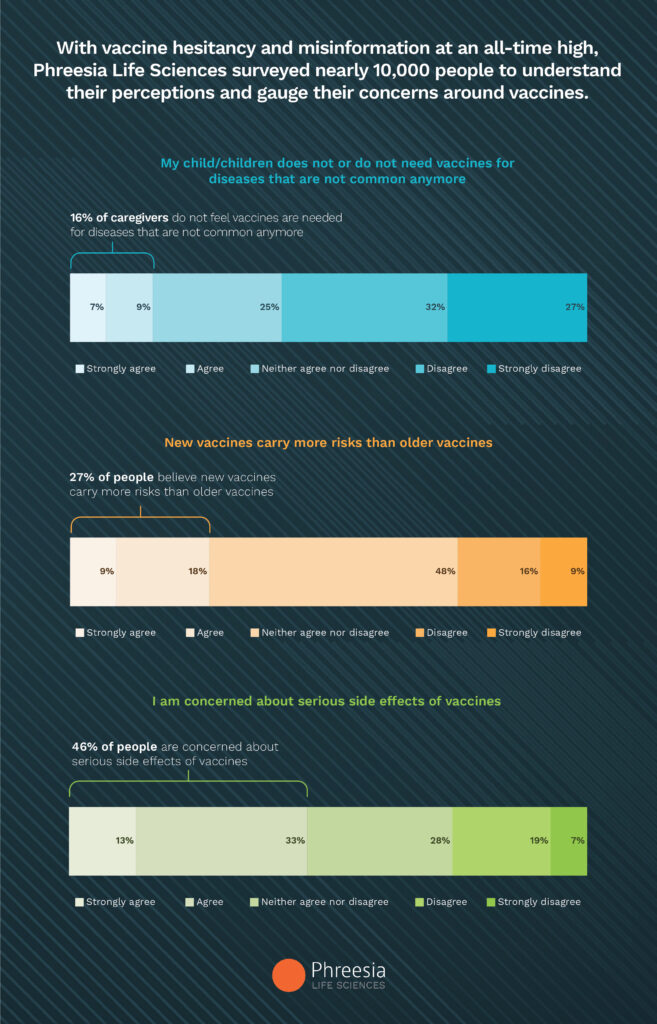Patients Need More Education Around Vaccines – And Not Just COVID-19 Vaccines: Surveys
Right now, the U.S public health officials, vaccine makers and other groups are striving to educate the public – and combat misinformation – about COVID-19 vaccines in a drive to improve vaccination rates and end the pandemic. But as new data show, it’s not just COVID-19 shots that patients need to learn more about.
A pair of recent Phreesia surveys, given to a combined total of nearly 345,000 patients when they checked in for doctors’ appointments, found that although patients largely recognize the importance of vaccines, many have concerns around safety and side effects -even when it comes to older, more established products. And that’s where pharma marketers need to step in.
In the first of the two surveys, taken by nearly 10,000 parents of adolescents between Nov. 30 and Dec. 10, 2020, respondents generally believed that childhood vaccines were effective, with 62.5% strongly agreeing and 28.6% agreeing. Caregivers concurred in similar percentages that childhood vaccines were important for their children’s health and that getting vaccines was a good way to protect children from disease.
But the survey also yielded worrying results for vaccine makers and public health officials. Close to 16% of parents either agreed or strongly agreed that their children didn’t need vaccines for diseases that are no longer common, and 25% didn’t have an opinion either way about such vaccinations.
Combined, those figures indicate that more than 40% of parents aren’t sure they need to vaccinate their children for diseases that aren’t currently prevalent – even though the rarity of those diseases hinges on vaccines and the herd immunity they confer. In recent years, outbreaks of vaccine-preventable diseases such as measles and mumps have shown that even small pockets of unvaccinated people can drive significant spread of contagious disease among both vaccinated and unvaccinated populations. That’s why it’s critical that healthcare professionals and vaccine makers continue to stress the importance of childhood vaccination.

Another troubling statistic in an era of unparalleled vaccine hesitancy: Nearly 46% of surveyed parents said they were concerned about vaccines’ side effects, with another 28.2% expressing no opinion about side effects either way. Together, those figures showed that 74% of parents were either worried or uncertain about the side effects of vaccines – despite an overabundance of evidence that vaccines are safe and rarely cause serious adverse reactions.
Finally, perhaps in reference to the Pfizer and Moderna mRNA COVID-19 vaccines that were making their way toward widespread adoption at the time, 27.1% of surveyed parents either agreed or strongly agreed that new vaccines carried more risks than older vaccines – and a whopping 47.6% neither agreed nor disagreed with that statement.
Those stats mirror results from a second, ongoing Phreesia survey, which has been taken by more than 335,000 adult patients since March 2021. Among those who answered, slightly more than half of polled patients (51%) said they were concerned about the safety and long-term side effects of COVID-19 vaccines, and 23.5% did not agree that it was important to receive all recommended vaccines.
The results clearly illustrate that pharma marketers have their work cut out for them, not only to convince patients to receive the COVID-19 vaccine, but also to make sure the vaccine hesitancy the country is currently seeing doesn’t spill over further to impact the rate of childhood vaccinations. While patients may be generally aware of vaccines’ role in staving off disease, it’s up to marketers to ease patients’ fears about vaccine safety and side effects and to highlight the continued importance of vaccination, no matter the disease area.

